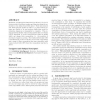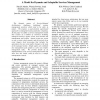1047 search results - page 122 / 210 » Learning the required number of agents for complex tasks |
CVPR
2005
IEEE
14 years 10 months ago
2005
IEEE
For large scale automatic semantic video characterization, it is necessary to learn and model a large number of semantic concepts. But a major obstacle to this is the insufficienc...
GECCO
2009
Springer
14 years 2 months ago
2009
Springer
Evolution of multi-agent teams has been shown to be an effective method of solving complex problems involving the exploration of an unknown problem space. These autonomous and het...
ICSE
2009
IEEE-ACM
13 years 5 months ago
2009
IEEE-ACM
The dynamic nature of Service-Oriented Architectures challenges traditional systems management practices which tend to be static in nature. We propose a goal-oriented, agent-based...
GECCO
2009
Springer
14 years 2 months ago
2009
Springer
A central tenet of embodied artificial intelligence is that intelligent behavior arises out of the coupled dynamics between an agent’s body, brain and environment. It follows t...
AAAI
1998
13 years 9 months ago
1998
A central problem in learning in complex environmentsis balancing exploration of untested actions against exploitation of actions that are known to be good. The benefit of explora...



